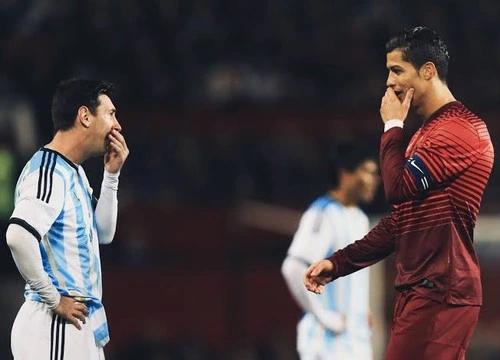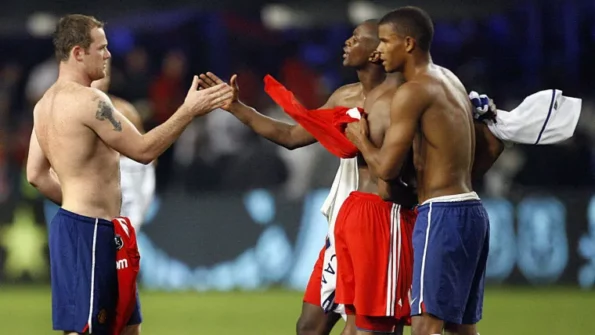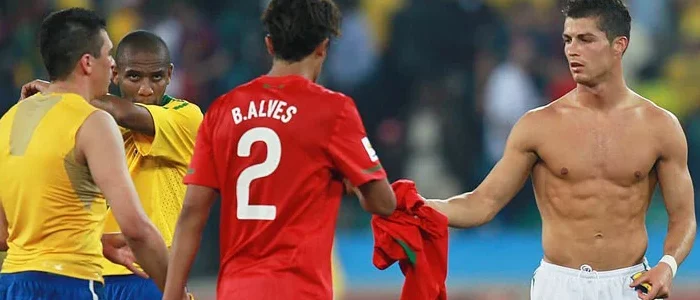As the final whistle blows, the stadium erupts with resounding cheers and applause. Victorious or defeated, soccer players from both teams gather on the field to partake in a unique ritual that has captivated fans for decades – exchanging jerseys. Join us as we unlock the secrets behind this sacred exchange and delve into the profound significance it holds within the beautiful game of soccer.
Introduction
1. The History behind Jersey Exchange
The practice of exchanging jerseys dates back to the early 20th century when professional soccer was gaining popularity in Europe. It started as a gesture of mutual respect between opponents after a grueling match. At that time, jerseys were not commercially available for purchase by fans, making them valuable commodities for players.
As time passed and commercialization took over sports, jersey exchanges became more than just a sign of respect. It evolved into an opportunity for players to showcase their personal brand and build relationships with other teams and sponsors.
2. Mutual Respect
At its core, jersey exchange is still seen as an act of mutual respect between two opposing players. In the heat of competition, emotions can run high on both sides. But at the end of the game when all is said and done, exchanging jerseys is a way to acknowledge each other’s efforts on the field.
For many players, swapping jerseys with an opponent is a sign of admiration and recognition for their skills. It also serves as a reminder that, despite being rivals on the field, they are all part of the same soccer community.
3. Building Relationships
Soccer is more than just a game; it is a global community that brings people together from different backgrounds. Through jersey exchanges, players have the opportunity to build relationships with other teams and expand their network in the soccer world.

It is not uncommon to see players exchange jerseys with former teammates or opponents who have since become close friends. This tradition highlights the camaraderie and sportsmanship that soccer promotes.
4. A Keepsake for Fans
With the commercialization of soccer, jerseys have become highly sought after by fans. The exchange of jerseys between players has now become a way for fans to get their hands on these coveted items.
After a match, fans often gather near the tunnel where players exit the field in hopes of getting a jersey from their favorite player. This adds an element of excitement and anticipation to the tradition, making it even more special for both players and fans alike.
Symbolism and Sportsmanship
Symbolism and sportsmanship are two important aspects of soccer that go hand in hand. It is often overlooked, but the exchange of jerseys between players at the end of a match holds deeper meaning than just a simple act of trading shirts.
1. Symbolism
Firstly, let’s dive into the symbolism behind exchanging jerseys. In soccer, each team’s jersey represents their identity and unity on the field. The colors, logo, and design all hold significance to the team and its fans. By exchanging jerseys with an opponent, players are symbolically acknowledging their respect for each other’s teams.
In addition to this, exchanging jerseys can also be seen as a sign of solidarity and friendship between opponents. It signifies that despite being on opposing sides during the game, they share a mutual love for the sport and have formed a bond through playing against each other.
Furthermore, exchanging jerseys can also be seen as a gesture of gratitude towards an opponent who has performed exceptionally well during the match. It is a way for players to show appreciation for their competitor’s skills and abilities on the field.

2. Sportsmanship
On another note, sportsmanship plays a crucial role in why soccer players exchange jerseys. Sportsmanship encompasses fair play, respect for opponents and officials, and graciousness in both victory and defeat. Exchanging jerseys after a game demonstrates sportsmanship and the ability to put aside any previous animosity among players.
Moreover, exchanging jerseys promotes camaraderie among players, regardless of their team affiliation. It can also serve as a reminder that at the end of the day, soccer is just a game and that there is more to it than just winning or losing.
Personal Connection
The tradition of exchanging jerseys between soccer players has become a common sight at the end of every game. For many fans, it is seen as a sign of mutual respect and camaraderie among opponents. But there is much more to this gesture than meets the eye.
At its core, the act of exchanging jerseys serves as a personal connection between two players. It goes beyond just trading pieces of clothing; it symbolizes the shared experience and bond that is formed on the field. Despite fierce rivalries and intense competition, soccer players are united by their passion for the game.
One reason why players exchange jerseys is to show appreciation for their opponent’s skill and talent. Soccer is a physically demanding sport that requires both mental and physical strength. Players competing against each other can motivate each other to perform at their peak level. By exchanging jerseys, they acknowledge each other’s abilities and pay tribute to their opponent’s hard work and dedication.

Moreover, exchanging jerseys allows players to form connections with each other beyond their teams or countries. Despite the commercialization of sports, soccer is ultimately about building relationships and connecting through a passion for the game. Swapping jerseys reminds players that they are part of the global soccer community, regardless of their team or country.
Finally, exchanging jerseys also serves as a reminder of the memories made on the field. Every game is a unique experience, and players often form special memories that they will cherish for years to come. By exchanging jerseys, players are creating a tangible memento of that specific game and the bond formed between them.
Conclusion
In conclusion, the tradition of exchanging jerseys in soccer is a way for players to show respect and admiration for their opponents. It promotes sportsmanship and camaraderie between teams, regardless of the outcome of the game. Next time you see players swapping jerseys on the field, remember that it symbolizes much more than just a piece of clothing being exchanged.
FAQs
1. What does it mean to swap jerseys in soccer?
Players from opposing teams exchange jerseys as a sign of mutual respect and admiration in soccer. It is regarded as a gesture of sportsmanship and camaraderie between players, regardless of the outcome of the game. As well as being a symbol of unity within the soccer community, the act of swapping jerseys creates a moment of connection between players.
2. Why do footballers swap shirts at half time?
Football players often exchange shirts at half time as a symbol of respect and sportsmanship, and it can also serve as a way to collect memorabilia or show support for the other team. This tradition promotes unity and respect in the sport.
